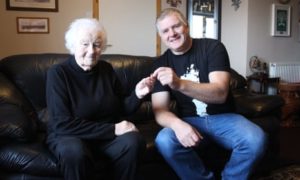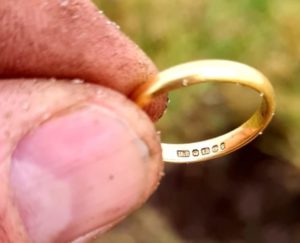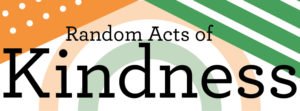

“Persistence is nothing more than concentrated
effort mixed with determination and faith.”
Hey Sunday Brewers!
Want to start off your week with some creative ideas and inspiration? Keep scrolling for…
✅ The surprising ingredient researchers believe is an antidote to anxiety.
✅ The power of fate in marketing (and why you shouldn’t hide accidents)
✅ Discover how FAs are using virtual assistants to amplify lead generation
But first, a serendipitous (true) story to kick off your Sunday…
The First Sip

Peggy MacSween was in her mid-30s when she lost her gold wedding band.
The ring slipped right off her finger while she was gathering potatoes at her home’s farm in Outer Hebrides, Scotland.
“I was shaking the sand out of my gloves and the ring disappeared. I didn’t know until I got home,” Peggy, now 86, recalls. “I went out once or twice to look for it, but there was no way of finding it.”
Her husband, John, whom she married in 1958 and passed away a couple of years ago, bought her a replacement.
However, she’s never forgotten about that ring.
So when she met a fellow islander and metal detectorist, Donald MacPhee, she couldn’t help but bring up the 50-year-old mystery.
Donald, who is always up for a challenge, immediately went to work searching for the ring.
The only problem?
The farm was over an acre (and there was no telling where it would have settled after half a century).
Donald spent a considerable amount of time searching the sandy coastal meadow where the potato patch once was.
“For three days I searched and dug 90 holes,” Donald recalls.
“The trouble is gold rings make the same sound on the detector as [aluminum can tabs] and I got a lot of those – as well as many other things such as horseshoes and cans.”
But on the third day he struck gold…literally.

“I was absolutely flabbergasted,” he recalls. “It was a 1 in a 100,000 chance and certainly my best find. It was a fluke. There was technique involved, but I just got lucky.”
Donald immediately grabbed the ring – which was still in “immaculate” condition – and ran it straight to Peggy’s home.
“I couldn’t believe it, but there it was,” Peggy smiles as she remembers the moment she was reunited with the ring. “I thought I would never see it again.”
Peggy plans to wear the original ring alongside the replacement ring her late husband bought her.
She says both rings are a reminder of the amazing man she was blessed to spend so many years with.
1 Caffeinated Neurohack

A brand new study published in a leading psychology journal finds that performing acts of kindness can actually heal anxiety and ease depression.
In the study, researchers split 122 people into three groups and tracked them for 10 weeks.
Two groups were assigned techniques that are often used in cognitive behavioral therapy for depression.
Members of the third group were asked to perform 6 random acts of kindness per week.
The results?
While participants in all three groups showed improvement, those in the group performing random acts of kindness noticed significantly better results.
“Acts of kindness showed an advantage over both social activities and cognitive reappraisal by making people feel more connected to other people, which is an important part of well-being,” the study says.
Most encouraging was how the group saw symptoms of anxiety and depression plummet.
“Something as simple as helping other people can go above and beyond other treatments in helping heal people with depression and anxiety,” co-author Jennifer Cheavens notes.
While the natural tendency is to hole up in the privacy of your home when you’re anxious or depressed…
…this study proves looking beyond yourself may be the best way to heal.
And here’s what’s really neat: You may be able to use random acts of kindness as a preventative measure for staving off anxiety and depression.
So no matter where your mental health is at the moment, kindness seems to be the best medicine.
☕ TL;DR: This surprising ingredient may be the antidote to anxiety.
Marketing Psychology Quick Hit

Let’s say you’re shopping for an anniversary ring online for your spouse and the website’s home page proudly boasts:
All of our gold is sourced from the Green Forest Gold Mine, which was unintentionally stumbled upon by our founder Larry Pope, when he was on a hike with his kids.
Do you think knowing that the discovery of the gold mine was unintentional would make you more OR less likely to buy from that company?
While previous research suggests that consumers tend to value effort and hard work – supporting brands that keep pushing and never give up – a brand new study says, not so fast.
The study, published in the Journal of Experimental Psychology, finds “communicating unintentionality in discovery increases consumer preference.”
The reason?
Fate.
People find unintentional discoveries and unexpected events oddly intoxicating.
The fact that an ordinary person stumbled upon something makes people feel like they’re experiencing something that might not have been available to them under other circumstances.
When a product or service feels ‘fated,’ it’s difficult for someone to say no.
☕ TL;DR: Don’t underestimate the role of fate in marketing.
What’s New in SHIFT Nation?
Discover how FAs are using virtual assistants to amplify lead generation results in 2023! [ 🎥 Watch Now! ]
Weekly Industry Catch-Up

🔹 Mortgage demand jumps. 30-year fixed-rate mortgages hit their lowest rate (6.23%) since September, which spurred a 28% week-over-week jump in demand. However, demand is still 35% lower today than it was one year ago.
🔹 The ‘Big Layoff’. A trio of tech giants are laying off a collective 40,000 employees this week as slower revenue growth emerges on balance sheets. Amazon is laying off 18,000 employees, while Google’s CEO just sent a memo to his staff that 12,000 people will be let go. Microsoft is following suit with 10,000 layoffs of its own.
🔹 Cathie is crushing. After a horrendous year that saw the ARK Innovation ETF fund lose more than 60% of its value, Cathie Woods and co are staging a much-needed comeback. Nine of ARK’s stock holdings are up 17% or more this year, with the fund as a whole topping 10% growth thus far in 2023. That outpaces the S&P 500’s 2.4% YTD return.
Enjoy your Sunday,
Jeremiah D. Desmarais
CEO, Advisorist
#1 in ROI-Driven Training for Advisors





